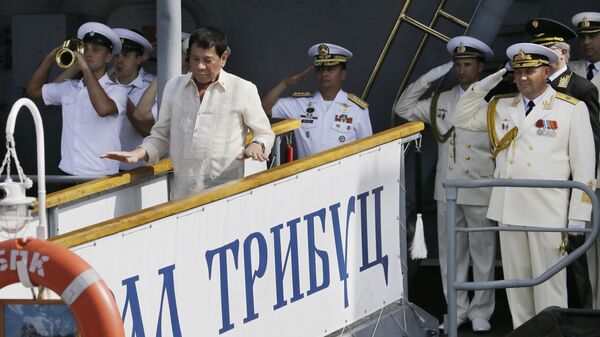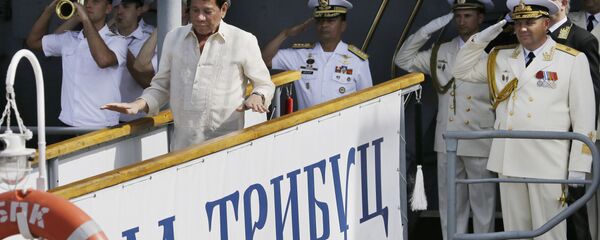In June 2009, then-Philippine President Gloria Arroyo made an official visit to Russia, which coincided with her attendance at the St. Petersburg International Economic Forum (SPIEF).
In November 2015, Russian Prime Minister Dmitry Medvedev met with former Philippine President Benigno Aquino on the sidelines of the APEC Summit in Manila (Philippines).
In September 2016, Medvedev held negotiations with Duterte during the East Asia Summit in Vientiane in Laos.
In November 2016, Russian President Vladimir Putin met with the Philippine leader on the sidelines of the Asia-Pacific Economic Cooperation (APEC) Summit in Lima, where the two leaders expressed their mutual commitment to expanding and diversifying bilateral ties.
On December 4-6, 2016, Philippine Secretary of Foreign Affairs Perfecto Yasay paid a working visit to Moscow. During his negotiations with Russian Foreign Minister Sergey Lavrov, the officials exchanged opinions on a wide range of bilateral issues.
Parliamentary exchanges have also taken place. In November 2014, Russian Federation Council Speaker Valentina Matvienko officially visited Manila. In October 2015, President of the Philippine Senate Franklin Drilon visited Russia. Ministries and departments of the two countries also maintain contact.
Russia and the Philippines have similar views on many international issues. They cooperate in the United Nations and a variety of formats within the Asia-Pacific region, including dialogue partnerships such as Russia-Association of Southeast Asian Nations (ASEAN), APEC, the East Asia Summit, the ASEAN Regional Forum on security issues, the ASEAN Defense Ministers’ Meeting (ADMM) and the Asia-Europe Meeting (ASEM).
According to the Russian Federal Customs Service, the country's trade with the Philippines totaled about $440 million, including Russian exports worth $145.8 million and Philippine imports worth $294.2 million.
Russia’s exports to the Philippines consist of mineral products, which take up over 63 percent of total Russian exports to the Philippines, as well as timber and pulp, metals and metal produce, cars, machinery and transport vehicles, chemicals, food products and agricultural raw materials. Cars, machinery and transport vehicles are also the key import items and amount to almost 80 percent of Russia’s total imports from the Philippines. Other imports include food products and agricultural raw materials, textiles and footwear and chemical industry products.
Promising areas for Russian-Philippine cooperation include agriculture, transport, energy, telecommunications, and high-tech.
The Russia-Philippines Intergovernmental Commission on Trade and Economic Cooperation was set up in November 2015 to promote bilateral trade and economic ties. The commission held its first session on April 28, 2017, which was co-chaired by Russian Deputy Economic Development Minister Alexander Tsybulskiy and Undersecretary Ceferino Rodolfo of the Philippine Department of Trade and Industry.
In 2009, the Philippine-Russian Business Council was formed, followed by a similar Russian agency established under the Russian Chamber of Trade and Industry in November 2011.
The two countries cooperate in military equipment and military technology, including Russian military exports to the Philippines and the exchange of military delegations. The Philippines has expressed interest in Russian small arms purchases, precision-guided missiles, helicopters and aircraft.
The Russian missile cruiser Varyag and sea tanker Pechenga visited Manila on April 20-24, 2017. Duterte went aboard the Varyag.
In April 2017, Philippine Secretary of National Defense Delfin Lorenzana attended the 6th Moscow Conference on International Security and met with Russian Defense Minister Sergei Shoigu.
Bilateral ties continue to develop in science, education, culture, tourism and sport.
The countries signed an agreement on science and research cooperation and academic exchanges between the Far Eastern Federal University and the University of the Philippines in November 2015 on the sidelines of the APEC Summit in Manila. Filipinos are also increasingly interested in Russian language studies. In August 2012, the University of San Carlos in Cebu launched the Russkiy Mir Center, which opened Russian language courses in February 2016. Similar centers are to be opened at the University of the Philippines in Bogota and the Ateneo de Manila University.
Last year marked 40 years since Russia and the Philippines established diplomatic relations. On the occasion, Days of Russian Culture were organized in Manila on October 19-24 and a Festival of Philippine Culture was held in Moscow. Days of Philippine Culture in Russia are scheduled for 2017.





